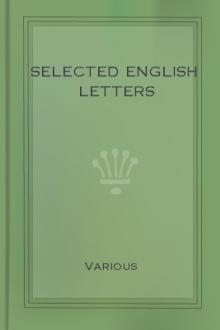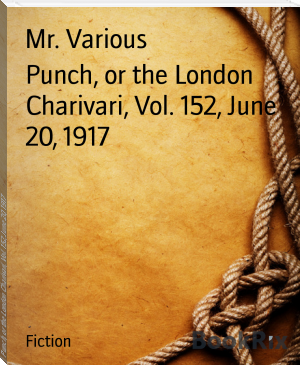Selected English Letters by - (free e novels txt) 📕

- Author: -
- Performer: -
Book online «Selected English Letters by - (free e novels txt) 📕». Author -
Your most loving obedient daughter and bedeswoma Margaret Roper, which daily and howrely is boude to pray for you, for whom she prayeth in this wise, that our lord of his infinite mercye geve you of hys hevenly comfort, and so to assist you with hys speciall grace, that ye never in any thing declyne from hys blessed will, but live and dye his true obedient servaunt. Amen.
ROGER ASCHAM1515-1568
To Lady Jane Grey
A most accomplished maiden
Augsberg, 18 Jan. 1551.
Most Illustrious Lady,
In this long travel of mine, I have passed over wide tracts of country, and seen the largest cities, I have studied the customs, institutes, laws, and religion of many men and diverse nations, with as much diligence as I was able: but in all this variety of subjects, nothing has caused in me so much wonder as my having fallen upon you last summer, a maiden of noble birth, and that too in the absence of your tutor, in the hall of your most noble family, and at a time when others, both men and women, give themselves up to hunting and pleasures, you, a divine maiden, reading carefully in Greek the Phaedo of the divine Plato; and happier in being so occupied than because you derive your birth, both on your father's side, and on your mother's, from kings and queens! Go on then, most accomplished maiden, to bring honour on your country, happiness on your parents, glory to yourself, credit to your tutor, congratulation to all your friends, and the greatest admiration to all strangers!
O happy Elmar in having such a pupil, and happier still you, in having such a tutor … I ask two things of you, my dear Elmar, for I suppose you will read this letter, that you will persuade the Lady Jane to write me a letter in Greek as soon as possible; for she promised she would do so … I have also lately written to John Sturm, and told him that she had promised. Take care that I get a letter soon from her as well as from you. It is a long way for letters to come, but John Hales will be a most convenient letter-carrier and bring them safely….
To LADY CLARKE
An offer of assistance
[London], 15 Jan. 1554.
Your remarkable love of virtue and zeal for learning, most illustrious lady, joined with such talents and perseverance, are worthy of great praise in themselves, and greater still because you are a woman, but greatest of all because you are a lady of the court; where there are many other occupations for ladies, besides learning, and many other pleasures besides the practice of the virtues. This double praise is further enhanced by the two patterns that you have proposed to yourself to follow, the one furnished you by the court, the other by your family. I mean our illustrious queen Mary, and your noble grandfather, Thomas More—a man whose virtues go to raise England above all other nations….
I am led to write thus not altogether by my admiration of you, but partly by my own wish and more from the nature of my own office. It was I who was invited some years ago from the University of Cambridge by your mother, Margaret Roper—a lady worthy of her great father, and of you her daughter—to the house of your kinsman, Lord Giles Alington, to teach you and her other children the Greek and Latin tongues; but at that time no offers could induce me to leave the University. It is sweet to me to bear in mind this request of your mother's, and I now not only remind you thereof, but would offer you, now that I am at court, if not to fulfil her wishes, yet to do my best to fulfil them, were it not that you have so much learning in yourself, and also the aid of those two learned men, Cole and Christopherson, so that you need no help from me, unless in their absence you make use of my assistance, and if you like, abuse it.
I write thus not because of any talents I possess (for I know they are very small) but because of my will (which I know is very great), and because of the opportunity long wished for and now granted me. For by favour of that great bishop the Lord Stephen of Winchester, I have been fetched away from the University to serve our illustrious queen at court, and that too in such a post, that I can there follow the same mode of life for the discharge of my duties as I did at the University for study. My office is to write Latin letters for the queen, and I hope I shall fulfil that office, if not with ability, yet faithfully, diligently, and unblameably … Farewell, most accomplished lady!
SIR FRANCIS BACON1561-1626
To Sir Thomas Bodley
With a copy of his book
[Nov. 1605.]
SIR,I think no man may more truly say with the Psalm Multum incola fuit anima mea, than myself. For I do confess, since I was of any understanding, my mind hath in effect been absent from that I have done; and in absence are many errors which I do willingly acknowledge; and amongst the rest this great one that led the rest; that knowing myself by inward calling to be fitter to hold a book than to play a part, I have led my life in civil causes; for which I was not very fit by nature, and more unfit by the preoccupation of my mind. Therefore calling myself home, I have now for a time enjoyed myself; whereof likewise I desire to make the world partaker. My labours (if I may so term that which was the comfort of my other labours) I have dedicated to the King; desirous, if there be any good in them, it may be as the fat of a sacrifice, incensed to his honour: and the second copy I have sent unto you, not only in good affection, but in a kind of congruity, in regard of your great and rare desert of learning. For books are the shrines where the saint is, or is believed to be; and you having built an Ark to save learning from deluge, deserve propriety in any new instrument or engine, whereby learning should be improved or advanced.
SIR THOMAS BROWNE1605-1682
To HIS SON THOMAS
Fatherly commendations
[c. 1667.]
I Receaved yours, and would not deferre to send vnto you before you sayled, which I hope will come vnto you; for in this wind, neither can Reare-admirall Kempthorne come to you, nor you beginne your voyage. I am glad you like Lucan so well. I wish more military men could read him; in this passage you mention, there are noble straynes; and such as may well affect generous minds. Butt I hope you are more taken with the verses then the subject, and rather embrace the expression then the example. And this I the rather hint unto you, because the like, though in another waye, is sometimes practised in the king's shipps, when, in desperate cases, they blowe up the same. For though I know you are sober and considerative, yet knowing you also to be of great resolution; and having also heard from ocular testimonies with what vndaunted and persevering courage you have demeaned yourself in great difficulties; and knowing your captaine to bee a stout and resolute man; and with all the cordiall friendshippe that is between you; I cannot omitt my earnest prayers vnto God to deliver you from such a temptation. Hee that goes to warre must patiently submitt vnto the various accidents thereof. To bee made prisoner by an vnequall and overruling power, after a due resistance, is no disparagement; butt upon a carelesse surprizall or faynt opposition; and you have so good a memorie that you cannot forgett many examples thereof, even of the worthiest commanders in your beloved Plutark. God hath given you a stout, butt a generous and mercifull heart withall; and in all your life you could never behold any person in miserie butt with compassion and relief; which hath been notable in you from a child: so have you layd up a good foundation for God's mercy; and, if such a disaster should happen, Hee will, without doubt, mercifully remember you. How euer, let God that brought you in the world in his owne good time, lead you through it; and in his owne season bring you out of it; and without such wayes as are displeasing vnto him. When you are at Cales, see if you can get a box of the Jesuits' powder at easier rate, and bring it in the bark, not in powder. I am glad you haue receaued the bill of exchange for Cales; if you should find occasion to make vse thereof. Enquire farther at Tangier of the minerall water you told mee, which was neere the towne, and whereof many made use. Take notice of such plants as you meet with, either upon the Spanish or African coast; and if you knowe them not, putt some leaves into a booke, though carelessely, and not with that neatenesse as in your booke at Norwich. Enquire after any one who hath been at Fez; and learne what you can of the present state of that place, which hath been so famous in the description of Leo and others. The mercifull providence of God go with you. Impellant animae lintea Thraciae.
TO HIS SON EDWARDCentenarians
15 Dec. [1679.]
DEARE SONNE,Some thinck that great age superannuates persons from the vse of physicall meanes, or that at a hundred yeares of age 'tis either a folly or a shame to vse meanes to liue longer, and yet I haue knowne many send to mee for their seuerall troubles at a hundred yeares of age, and this day a poore woeman being a hundred and three yeares and a weeke old sent to mee to giue her some ease of the colick. The macrobii and long liuers which I haue knowne heere haue been of the meaner and poorer sort of people. Tho. Parrot was butt a meane or rather poore man. Your brother Thomas gaue two pence a weeke to John More, a scauenger, who dyed in the hundred and second yeare of his life; and 'twas taken the more notice of that the father of Sir John Shawe, who marryed my Lady Killmorey, and liueth in London, I say that his father, who had been a vintner, liued a hundred and two yeares, or neere it, and dyed about a yeere agoe. God send us to





Comments (0)